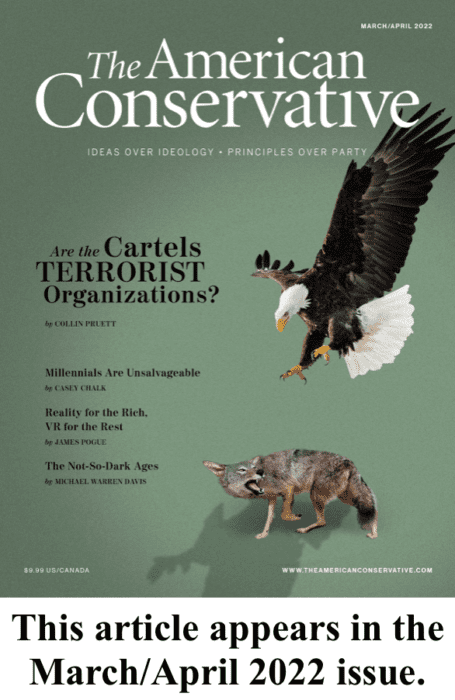No Hope for Millennials

The Dumbest Generation Grows Up: From Stupefied Youth to Dangerous Adults, by Mark Bauerlein, (Regnery Gateway: 2022), 256 pages.
Complaining about the youth of today is an ancient pastime. The Roman poet Horace (first century B.C.) wrote in his Odes:
Our sires’ age was worse than our grandsires’.
We, their sons, are more worthless than they;
so in our turn we shall give the world a progeny yet more corrupt.
Five hundred years before that, Confucius in his Analects contrasted the people of antiquity with those of his own day, observing that his generation’s ancestors were incorruptible and straightforward while his contemporaries were “licentious… quarrelsome, and irritable.”
Emory Professor Emeritus of English and First Things Senior Editor Mark Bauerlein, whose book, The Dumbest Generation: How the Digital Age Stupefies Young Americans and Jeopardizes Our Future, elicited much criticism when published in 2008, is familiar with people waving away his concerns about millennials by citing such examples. Unlike the ancients, who relied on anecdotal observation to complain about the young, Bauerlein had statistical evidence—mounds of it. That body of research continues to grow, as he documents in his sequel, The Dumbest Generation Grows Up: From Stupefied Youth to Dangerous Adults.
Millennials read less than earlier generations: most spend an hour or less on leisure reading per week. The number of people in their age cohort who read “almost every day” is a third less than Gen Xers at the same age. They are the least engaged generation in the workforce and change jobs more often than other generations. Anecdotally, they also have a reputation for being whiny, entitled, and requiring constant positive reinforcement—attributed by many to their “everybody gets a trophy” upbringing.
They are depressed, distrustful, distracted, and disconnected. More than half of millennials reported feeling overwhelming anxiety in 2020. A majority of them believe “most people can’t be trusted.” Many are addicted to their smartphones and pornography. They are marrying less: the percentage of millennials who marry by age 40 will be lower than any previous generation of Americans. And they are irreligious, with 40 percent claiming no religious affiliation.
Bauerlein doesn’t catalog all this as an exercise in self-righteous finger-wagging. Rather, the retired professor intimates that his generation, the boomers, failed millennials because they indulged and perpetuated the latter’s narcissistic adolescence. He explains:
The more the mentors complimented teens and early-twenty-somethings as a vanguard sufficient unto itself with no need for the guideposts of tradition, the more they ill-equipped them for adulthood…. They were never handed something that everybody needs: the religious and historical and cultural equipment to manage a busy world. They grew up with a gaping hole in their souls, and “the soul has needs that must be satisfied.”
Liberal arts programs traded Western civilization and the canon for “critical thinking” and independent studies in which analysis of movies, sitcoms, and even porn was just as intellectually relevant as Chaucer, Shakespeare, or Keats. According to this approach, no one needs to read The Iliad or the Divine Comedy. We just have to have the skills to read them.
This approach seemed to presume that the human person is like a computer. Just program the right code and the subject will crunch the numbers like Deep Blue against Kasparov. Except humans—with their affections, intellect, and will—are not machines. Humans need a rich and robust cultural and literary inheritance to shape their intellects and captivate their moral imaginations. Yet academics, in their disgust with what they viewed as the “Eurocentric” body of knowledge found in, say, E.D. Hirsch’s 1987 best-seller Cultural Literacy, opted instead for creativity, self-exploration, and multiculturalism.
The result is an anti-intellectual attitude among younger Americans who have been exhorted to celebrate themselves above all else. “They couldn’t detail the hardships of General Washington at Valley Forge or the significance of his withdrawal to Mt. Vernon after the War, but they knew he owned slaves, and that was the important thing,” writes Bauerlein. In my native Northern Virginia, woke bureaucrats caught up in anti-racist fervor have rechristened roads and schools named after not only Confederates like Robert E. Lee and J.E.B. Stuart, but Founding Fathers like Thomas Jefferson and George Mason.
This is perhaps unsurprising, given the immensely popular A People’s History of the United States by Marxist historian Howard Zinn, as well as more recent woke historical revisionist efforts, such as the 1619 Project, which instruct children to view the past as irredeemably racist. Regardless of what one thinks of the historicity of such thinking, an inevitable consequence is to persuade younger Americans that the metanarrative of Western civilization is a lie intended to obscure the reality of racist, patriarchal, and heteronormative power structures. Given that Americans’ knowledge of their history was paltry before these latest pedagogical adjustments, what confidence do we have that this will improve future student competency?
Bauerlein says the youth are not curious about the past. I think that’s half-right. They may not be curious about understanding it as it actually was, but they are deeply interested in recasting it as a subservient idol to their narcissistic identitarianism. Thus, an abundance of historical television programs, movies, and novels filled with anachronistic homosexual trysts, black utopian communes, and gender-fluid characters. For them the past is less a tutor than an outlet for egoistic fantasy.
Boomer enablers have raised a generation of young adults and thirty-somethings not only suffering from cultural illiteracy, but obsessed with microaggressions and trigger warnings. These weak-kneed militants throw around accusations of bigotry with the kind of haphazard, reckless abandon of a third-string quarterback hopelessly attempting a fourth-quarter comeback. That they’re unaccustomed to playing games they might lose only intensifies millennials’ emotivist proclivities.
Bauerlein cites one Oberlin student activist who complained about how “tired” the anti-racist, pro-LGBTQ+ fight made her. I noticed the ubiquity of such complaints in the highly combustible days and months following George Floyd’s death. Liberal media outlets overflowed with op-eds by anti-racism activists complaining about how exhausted they were having to explain the reality of systemic racism to the ignorant and unschooled, even including those with sympathetic ears.
It is the elevation of a self-assured, emotivist self that helps explain why woke ideologues don’t have the time or energy to entertain opposition to woke dogmatism. Just shout your enemies down, or cancel them. Depersonalize them so that you don’t feel guilty when you silence them or banish them from polite society. Do whatever it takes to preserve the millennial mantra, something Bauerlein calls the “happiness mandate”: Everyone deserves to be happy.
The sad irony is how terribly unhappy these millennials are. Even this, Bauerlein argues, can be traced towards their ignorance of literature, which retards their psychological and emotional maturity, and directs their energies in ways that exhaust rather than replenish. Like the anxiously obsessive and manipulative feminist Olive Chancellor in Henry James’ The Bostonians, all of life is viewed through the prism of activism. “A social conscience heightened to this level can never rest,” writes Bauerlein. It’s true—my local grocery store directs me not only to products that are organic or locally sourced, but black-owned, LGBTQ-owned, Asian-owned, and on and on. Every culinary choice is either for or against a better future!
“This woke gospel won’t help them get through life,” warns Bauerlein. Maybe not, though, to retool a phrase, it might be enough to get millennials through the “soft bigotry of low expectations” placed upon them by a pandering boomer generation that, like Dr. Frankenstein, is terrified by the monster it has created. Nevertheless, it’s worth considering how capable millennials will be of grappling with the diverse trials, both domestic and international, we will undoubtedly face in the ensuing decades.
Their weaker psychological and emotional maturity has already manifested itself in our nation’s academic institutions, where mobs of activist students have been able to force firings or resignations of their instructors, or run well-respected conservative thinkers, like Charles Murray and Ryszard Legutko, off their campuses. Though there are many reasons to be concerned about the viability of America’s universities, that students now wield the power of evaluating their own professors’ suitability for continued employment is deeply troubling. That they do so with such capricious hatred, often even for people who share many of the same political opinions, points to more alarming trends.
For example, they are more co-optable by consumerist or political forces that indulge their woke identities. Consider the speed with which the advertising industry has gone woke, tailoring itself to the predilections of liberal youth. The left lauds the presence of more BIPOC persons in commercials for fast food, alcohol, and video games, seemingly unaware of the cruel irony of encouraging products that cause obesity and addiction in populations that already disproportionately suffer from such maladies. This does not bode well in a world where countries like China have a growing ability to monitor and manipulate us through digital technology.
Millennial miseducation threatens republican self-government. One-third to one-half of millennials favor communist ideas and mistrust capitalism. They support limitations on freedom of expression—almost half believe that the First Amendment does not protect hate speech and that protesters are fully justified in shouting down speakers who are offensive or “hurtful.” They are what Bauerlein labels “utopians,” in that they have attached themselves to a woke religion defined by racial, sexual, and gender identitarianism. Like other utopians, they tend to malign their adversaries and pursue increasingly coercive measures to force others to accept their ideology.
 Bauerlein is not optimistic this trend can be reversed. “The Millennials have exited young adulthood forever; their intellectual habits are formed for life,’ he writes. “They’re lost; they’re gone; it’s over for them.” Maybe he’s right, though who could have predicted a resurgent conservatism and religious practice in the 1980s, in a generation who had been reared on mantras like “Love the One You’re With” and “Don’t Trust Anyone over 30”? Whatever the future holds, it would be worth Bauerlein revisiting this generation once again in another fifteen years.
Bauerlein is not optimistic this trend can be reversed. “The Millennials have exited young adulthood forever; their intellectual habits are formed for life,’ he writes. “They’re lost; they’re gone; it’s over for them.” Maybe he’s right, though who could have predicted a resurgent conservatism and religious practice in the 1980s, in a generation who had been reared on mantras like “Love the One You’re With” and “Don’t Trust Anyone over 30”? Whatever the future holds, it would be worth Bauerlein revisiting this generation once again in another fifteen years.
For those who want to preserve (or reinvigorate) the cultural patrimony our academic and political elites have so callously jettisoned, there are practical steps we can take. One is to familiarize yourself and your children with the many great authors and texts Bauerlein discusses throughout his book. Indeed, I credit a 2016 podcast interview of his with kindling my own love of classic noir fiction, especially the works of Raymond Chandler, James Cain, and Dashiell Hammett. These authors’ depictions of good and evil, vice and virtue, villains and heroes, are captivating. To have our imaginations be truly captivated is a strong bulwark against deceptive ideologies that will make us captives to emotivism and ignorance.
Casey Chalk writes about religion and culture issues for The American Conservative and is a contributing editor for the New Oxford Review. He is the author of The Persecuted: True Stories of Courageous Christians Living Their Faith in Muslim Lands (Sophia Institute Press).
Comments